I’m a great believer in the mantra “right plant, wrong place”, even when it comes to weeds, but in productive gardens, weeds will always pose a problem for most gardeners.
So, a good weed puller is an effective tool for any gardener, whatever your stance on these potentially problematic self-seeders. No matter where you garden, or how often you care for your soil, weeds will happen. They always find a way into the garden, whether it's on the wind or on your shoes.
In many cases, they’re welcome surprises, but some weeds present more of a problem than a pleasure, so follow our guide to find the best weed pullers for your garden, and hopefully, you’ll regain control in no time.
More...
Top Pick

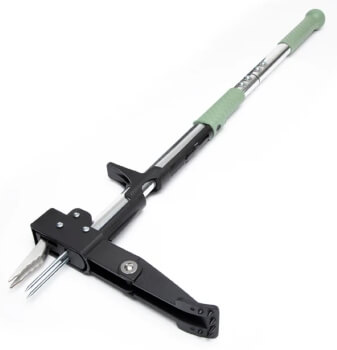
Premium Choice


Best Value

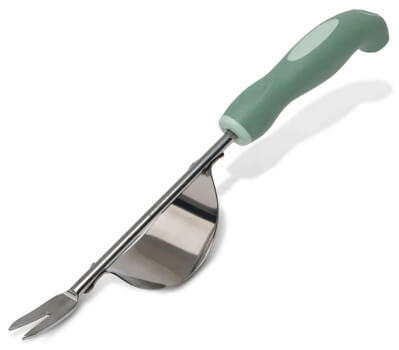
Best Weed Pullers for 2025
Product | Our Rating | Price | |
|---|---|---|---|
1. Hoselink 6581N Stand-up Weed Puller | 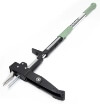 |  | |
2. Fiskars 1020126 Xact Weed Puller |  | ||
3. Hoselink 6634 Garden Weeder |  |  | |
4. Hoselink 6631-C Hand Scythe Weeder |  | ||
5. Fiskars 1000738 QuikFit Push-Pull Weeder | 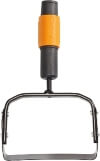 | ||
6. Spear & Jackson 50046 Root Puller with Wooden Handle | |||
7. Fiskars 1027045 Xact Small Weeding Knife |  |
Weed Pullers Australian Buyers' Guide
What are Weed Pullers?
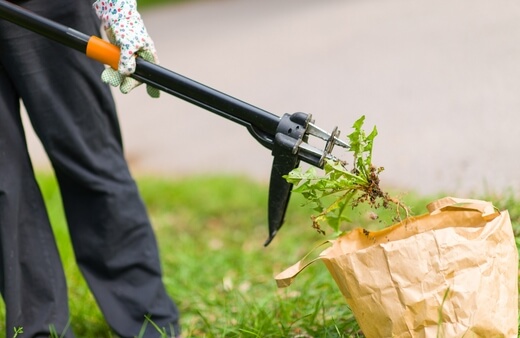
Weed pullers might be a bit of a general term, but it’s worth digging into some of the more effective varieties. From hoes to cultivators, most tools are able to extract weeds, but a handful, like weeding knives and forked weed-pullers, are perfectly designed to make the task that much easier.
Their sole purpose is to get down at the root and rag it from the soil in one piece because almost all garden weeds will come back if you leave their roots in place.
What to Look for When Buying a Weed Puller
The most important thing to look for in a good weed puller is the depth it can dig to. Some weeding knives might be easy to use, but their sharpened blade and short handles mean that you’re more likely to cut weeds, than pull them.
Forked weed pullers allow you to dig down directly below the weeds' top growth and extract all, or most, or the roots in one pull.
Frankly, nothing is more effective than a full-sized garden fork at extracting weeds, but the true-to-life problem of digging out with large tools between rows of veggies is ever-present, and often discounts forks and spades from the equation altogether!
Different Types of Weed Pullers (and how to use them)
There are four truly effective forms of weed pullers out there that are all worth looking into. Some are better for gardeners with mobility issues, or back problems, while others are fast and efficient provided you’re happy putting the work in.

Stand-Up Weed Pullers
Stand-up weed pullers or mechanical weed pullers are non-powered tools that work with a trigger mechanism to extract the majority of root from most weeds.
On stubborn roots, they won’t be 100% effective, but repeat treatments will eventually get rid of even the toughest weeds.
Weeding Knives
Weeding knives are fast and efficient, and a brilliant way to tidy your garden up quickly if you’re expecting company. However, they do have a tendency to accidentally cut through roots, rather than remove them entirely. And, as we know, leaving any part of the root in from stubborn perennial weeds like dandelions will result in a resurfacing a few weeks later.
Forked Hand Weeders
Forked weeders are hand tools, typically about the size of a trowel, which is designed to be used while kneeling. Their forked blade grabs either side of a tap root, and allows accurate removal of weeds in a similar fashion to a full-sized garden fork, without disturbing the surrounding plants.
Push-Pull Weeders
Push-pull weeders are just tiny hoes. They can be dug into the soil and pulled back towards the user to extract weeds and dislodge their lower roots or tap roots. Then, simply pull the loose weed from the soil, roots, and all.


Get Your Free Guide:
Master Growing Australian Natives eBook
A Must Have Complete Guide for Every Australian Garden
Get Your Free Guide:
Master Growing Australian Natives eBook
A Must Have Complete Guide for Every Australian Garden
For very deep-rooted weeds, these won’t work, but for the majority of Australian garden weeds, push-pull weeders are the fastest and most effective way to remove annual weeds or self-seeded plants that have sprouted in the wrong place.
When to Use a Weed Puller
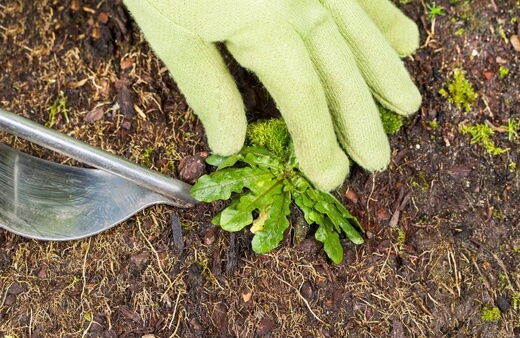
As well as knowing how to use each type of weed puller, it's important to know when to use them. Some weeds are year-round plants that can flower and set seed any time from January through to December, others have short lives and quickly go to seed.
Try to avoid using weed pullers while flowers are in seed, instead, deadheading them first to prevent the dispersal of seeds, before removing them.
Removing weeds as they come up (if you can recognise them by their young leaves) is the best time to take them out. Their roots will be looser in the winter soil, and newly seeded weeds will have barely rooted at all, making it easier to remove them, before they have a chance to flower.
Weed Puller Reviews
1. Hoselink 6581N Stand-up Weed Puller

Hoselink 6581N
Hoselink’s stand-up weed puller makes removing annual weeds a complete breeze. There’s nothing remotely complicated about this tool, despite its mechanical operation.
Simply push down on the step to dig in, then pull up to remove the weeds vertically. It won’t work perfectly on deep rooted weeds, but for the vast majority of garden weeds there are few tools that provide such an effective quick fix.
Pros
Cons
2. Fiskars 1020126 Xact Weed Puller

Fiskars 1020126
Fiskars Xact Weed Puller is designed for standing use and reduces back strain, and knee strain, and just generally makes weeding more pleasant. The simple mechanism is triggered by standing on the step, which drives the teeth in around the weed’s tap root, pulling up when you pull back.
For effective removal of most garden weeds, this Fiskars weeder is hard to beat, but for truly deep tap roots, you’ll still need an old-fashioned hand tool to finish the job!
Pros
Cons
3. Hoselink 6634 Garden Weeder

Hoselink 6634
The Hoselink forked garden weeder is a simple tool, with a clever addition to the tool’s main arm, which allows for easier rocking without having to dig around the weed.
The ergonomic handle is incredibly comfortable too, helping kneeling gardeners to push, pull and tug with ease.
Pros
Cons
4. Hoselink 6631-C Hand Scythe Weeder
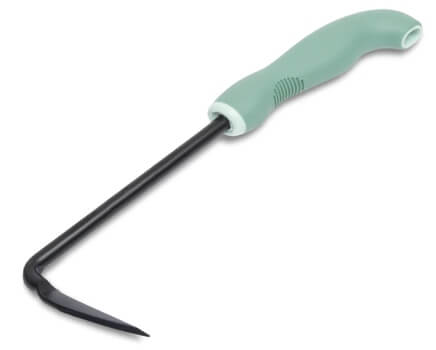
Hoselink 6631-C
This scythe weeder, or weeding knife, from Hoselink is a fantastic little weed puller. Its blunt blade reduces the chances of snapping roots, and its sharply pointed tip makes weeding between paving and concrete cracks straightforward.
The only real problem with this, as will all knife weed pullers, is that there is always a chance of snapping roots, and encouraging new growth on unwanted weeds.
Pros
Cons
5. Fiskars 1000738 QuikFit Push-Pull Weeder
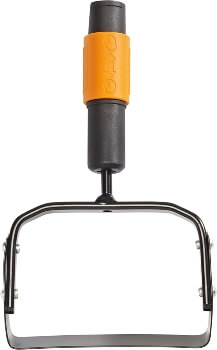
Fiskars 1000738
This simple push-pull weeder from Fiskars is durable, simple to use, and incredibly effective on self-seeded annual weeds. In essence, this weeder is a short-handled hoe, to be used while kneeling.
Like all hoes, it’s effective against weeds and will allow you to weed between rows of vegetables with minimal effort.
Pros
Cons
6. Spear & Jackson 50046 Root Puller with Wooden Handle

Spear & Jackson 50046
Spear & Jackson’s wooden-handled root pullers look good, work well, and are manufactured to the highest possible standards. For gardeners who like to get up close and personal with their soil, these forked-blade weed pullers are ideal but do require some degree of accuracy and attention to detail.
Pros
Cons
7. Fiskars 1027045 Xact Small Weeding Knife
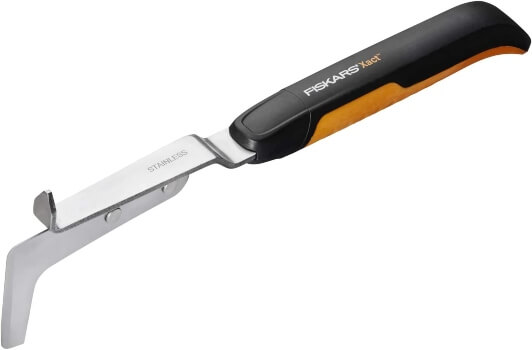
Fiskars 1027045
Fiskars Xact small weeding knife is comfortable, efficient, and well-made, but I’m not a fan of the blade, which does pose a potential risk of cutting through weed roots, rather than removing them completely.
In loose soil, this weeder works wonders, but on paths, and compacted or clay soil you’re more likely to cut roots than remove them entirely.
Pros
Cons
Our Weed Puller Top Picks for 2025
Best Weed Puller - Top Pick


Hoselink 6581N
Hoselink might be better known for their irrigation systems, but they have a wonderful range of general gardening tools that are really well designed too. Their Stand-Up Weed Puller is an effective way to stay on top of all your garden weeds.
Premium Choice Weed Puller


Fiskars 1020126
Fiskars Xact Weed Puller is part of their varied range of weed-removing tools, and by far their best. It’s ideal for gardeners with mobility issues, particularly back related, and will get rid of all your most common weeds in no time at all.
Best Value Weed Puller


Hoselink 6634
Weed pullers don’t need to break the bank, and can be picked up for next to nothing, even from trusted brands like Hoselink. Their garden weeder hand tool, with a forked blade and rocking arm, does the majority of the work for you, meaning all you need to do is locate the root, push down into it, and rock back. Job done!
Weed Pullers Frequently Asked Questions
What is the best weed puller tool?
Hoselink’s long-handled stand-up weed puller is the best weed puller tool we’ve found, with a comfortable grip, easy standing mechanisms, and impressively deep teeth that grab onto weeds at their base.
What is the best tool to get weeds out of gravel?
Gravel is a challenging surface to pull weeds from, partly because it’s usually covering compacted soil. You’ll need a deep weed puller, as roots will usually be deeper to find moisture lower down, so use a garden fork, or a forked weed puller and manually remove each weed, root and all.
What is the fastest way to pick weeds?
Stand-up weed pullers are the fastest way to pick weeds, as you target from above, rather than below, making finding each root much easier. They do tend to be slightly less accurate when it comes to removing the whole root though, so don’t rush the job.
What kills weeds permanently?
The only way to permanently kill weeds is by removing them, their roots, and their seeds. Weed killers will kill individual weeds, but tougher weeds will often regrow in a few weeks' time, even after strong chemicals like glyphosate.
Should weeds be pulled wet or dry?
Soil is more pliable, and offers less resistance when wet. If you plan on removing weeds during dry weather, water the ground really thoroughly before pulling them. This not only loosens the soil but will plump up and stiffen roots so they are less likely to snap.
Is it better to cut or pull weeds?
Always, always, always, pull weeds. Cutting weeds is simply deadheading, and not only won’t remove them but can actually invigorate them, producing further flushes of flowers and seeds as a result.
Should I pour boiling water on weeds?
You can pour boiling water on freshly emerging seedlings, but should not repeat the process more than twice a year. Pouring boiling water on established weeds will kill the top growth, and the roots will remain largely unharmed, but the soil bacteria that benefits wanted plants nearby will be damaged, causing further problems in the garden.
For more gardening inspiration see our guides to garden forks, choosing the best hoe and, if you’re getting desperate, check out our guide to garden weed killers, which can help get rid of the most troublesome weeds.
Make Dealing with Weeds Easier by Using the Best Weed Pullers Available Today
Weed pullers are simple tools with simple applications, but make gardening far easier. All tools should be that straightforward, but most aren’t, so it's nice to find something that just does what it says on the tin.
Published on February 26, 2023 by Gary Clarke
Last Updated on February 5, 2025




